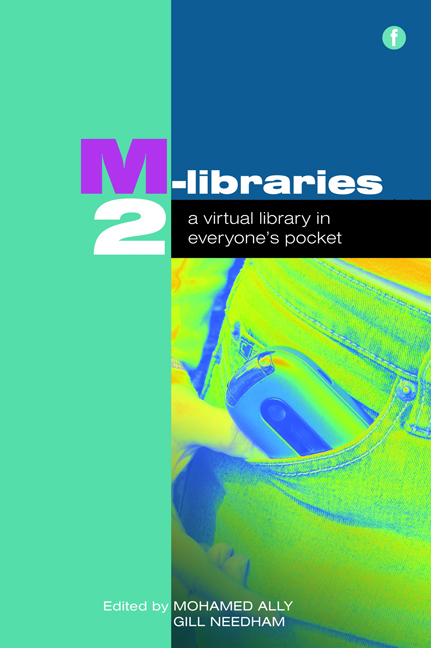Book contents
- Frontmatter
- Contents
- Acknowledgements
- Contributors
- Foreword
- Introduction
- PART 1 M-LIBRARIES: DEVELOPMENTS AROUND THE WORLD
- PART 2 TECHNOLOGY IN M-LIBRARIES
- PART 3 APPLICATION OF M-LIBRARIES
- PART 4 M-LIBRARIES AND LEARNING
- 18 Mobilizing the development of information skills for students on the move and for the workplace: two case studies of mobile delivery in practice
- 19 The library's place in a mobile space
- 20 M-libraries in distance education: a proposed model for IGNOU
- 21 Bridging the mobile divide: using mobile devices to engage the X and Y generations
- 22 Information literacy gets mobile
- 23 Library and Student Support (L&SS): flexible, blended and technology-enhanced learning
- PART 5 BUILDING THE EVIDENCE BASE FOR M-LIBRARIES
- Conclusion
- Index
23 - Library and Student Support (L&SS): flexible, blended and technology-enhanced learning
from PART 4 - M-LIBRARIES AND LEARNING
Published online by Cambridge University Press: 08 June 2018
- Frontmatter
- Contents
- Acknowledgements
- Contributors
- Foreword
- Introduction
- PART 1 M-LIBRARIES: DEVELOPMENTS AROUND THE WORLD
- PART 2 TECHNOLOGY IN M-LIBRARIES
- PART 3 APPLICATION OF M-LIBRARIES
- PART 4 M-LIBRARIES AND LEARNING
- 18 Mobilizing the development of information skills for students on the move and for the workplace: two case studies of mobile delivery in practice
- 19 The library's place in a mobile space
- 20 M-libraries in distance education: a proposed model for IGNOU
- 21 Bridging the mobile divide: using mobile devices to engage the X and Y generations
- 22 Information literacy gets mobile
- 23 Library and Student Support (L&SS): flexible, blended and technology-enhanced learning
- PART 5 BUILDING THE EVIDENCE BASE FOR M-LIBRARIES
- Conclusion
- Index
Summary
Introduction
In recent years there has been growing debate about a new method of teaching and learning which is flexible, blended and facilitated by technology, allowing 21st-century learners to work and study in more individual, personalized and portable ways. This new era of learning is known as mobile learning (m-learning).
The m-learning concept has been pushed to the forefront of educational debate by the present ubiquitous ownership of mobile devices amongst learners (such as mobile phones, portable audio players and laptop computers), which has created a perceived need amongst this generation of learners to use such devices in the academic arena. Furthermore, employers are indicating that the skills sets that graduates currently possess are no longer relevant in the present working world; the ability to collaborate, communicate, be creative and constructively criticize are now high on the agenda (Bruns et al., 2007).
Background
Within Liverpool John Moores University (LJMU) there are key factors influencing the requirements for more flexible, blended and technologyenhanced learning opportunities. In 2006 the LJMU Academic Board approved a revised and updated Learning, Teaching and Assessment (LTA) Strategy. New and/or enhanced priority areas include a greater focus on student skill development as demanded by employers, accessibility and inclusivity, and a research-informed curriculum. M-learning falls under two of these new and/or enhanced priorities, namely key objectives 3 and 4. Key objective 3 stipulates that, as a university, LJMU will support the learning needs of all students where a flexible approach to learning is defined as a key goal. Furthermore, key objective 4 states that LJMU will strive to develop and enhance its student's employability, achieved through connecting students to the world of work, equipping them with the standard base of graduate skills and teaching them digital literacy skills.
A major cross-university review of how it supports the student experience has stimulated a radical review of services, with LJMU's three Learning Resource Centre (LRC) sites adapted to offer improved services to the student body. Technology-rich and flexible learning spaces will be two key enhancements to the learning spaces currently provided, in which student use of personal and mobile devices will be supported and encouraged. To address this shift, Library and Student Support (L&SS) carried out a six-month research project to critically investigate and analyse m-learning in a higher education (HE) context and examine how it can best be supported.
- Type
- Chapter
- Information
- M-Libraries 2A virtual library in everyone's pocket, pp. 215 - 218Publisher: FacetPrint publication year: 2010
- 2
- Cited by

